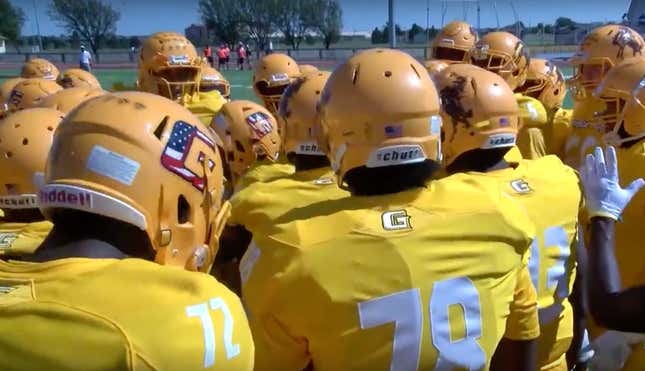
Football coaches at Garden City Community College, a prominent junior college program in Kansas that has played in two of the last three NJCAA championship games, reportedly delayed for 25 minutes before contacting paramedics after finding 19-year-old Braeden Bradforth collapsed outside his dorm last August following the first day of summer conditioning sessions. Bradforth, an offensive lineman from Neptune, New Jersey, died of exertional heat stroke later that evening, at a local hospital.
The fresh and awful details of the circumstances that led to Bradforth’s death come by way of the Associated Press, who reviewed a batch of emails and “copies of dispatch and emergency medical service records, hospital records, a coroner’s report and autopsy results,” provided by the attorney for Bradforth’s mother. They describe a sequence that began with a tough summer practice featuring 36 50-yard sprints in afternoon heat. Following the session, Bradforth, a 300-pound offensive lineman, stumbled and appeared to be in rough shape leaving the field, as noted by assistant coach Caleb Young:
Young describes being interested in getting the last straggling players, including Bradforth, to the meeting on time. He wrote that he told Bradforth, “Hey, you’re good. Let’s go,” to which Bradforth responded, “Yeah, I’m good. I’m good.”
Soon, however, Bradforth started walking toward his dorm, and Young asked him if he was quitting the team. Bradforth didn’t respond verbally but shook his head. Young said he went to the team meeting and told a coach that Bradforth had quit.
Teammates later noticed Bradforth “passed out” outside his dorm and notified Young, who found Bradforth slumped, “in visible distress,” and “making a stressful moan” in a narrow alley. Here is where Young, as a person in a position of authority, should’ve immediately called paramedics. Instead, incredibly, Young called head football coach Jeff Sims, “for instruction to see how we wanted to handle the situation.”
Sims, as a person in a position of even more authority, and confronted by the impossible-seeming fact that one of his assistants had called him, a football coach, instead of medical professionals, should’ve immediately called paramedics himself, and also probably should’ve fired Young. Instead, Sims advised Young to call athletic trainer T.J. Horton. While these various men who should’ve known better were busy treating this like a football problem and not a medical emergency, Bradforth’s teammates were reportedly “filling jugs and bottles from drinking fountains to pour water on Bradforth and attempt to make him drink.”
When Horton, the trainer, finally arrived and found a 19-year-old passed out in an alley, moaning, having water dumped on him by panicking teammates, he should’ve immediately called paramedics. Instead, he reportedly spent some time trying to get Bradforth to respond. By the time he finally called paramedics 25 minutes had elapsed from the time teammates discovered Bradforth passed out in the alley. The details from here are very grim and sad:
Paramedics wrote that when they arrived Bradforth was wet, moaning and sitting slouched over with his head leaning on a building. The paramedics’ report noted coaches had made all the players go back to their rooms “so any witness(es), if any, were not present at this time.”
As emergency workers loaded him onto the stretcher, Bradforth began to choke, opened his eyes and threw up what looked like “dirty motor oil,” Young wrote. Bradforth arrived at the hospital at 10:33 p.m. in critical condition. He died at 11:06 p.m., hospital records show.
E. Randy Eichner, a University of Oklahoma expert, told the Associated Press that if Bradforth had been put in a tub of icy water right away, “he would have walked home in good health and played the next day.” Last month, following an insufficient internal review, and under mounting pressure from Bradforth’s family and the New Jersey congressional delegation, Garden City Community College finally agreed to an independent investigation, reportedly headed by the firm that handled the investigation of Jordan McNair’s death at the University of Maryland in May 2018. Read the full AP report here.